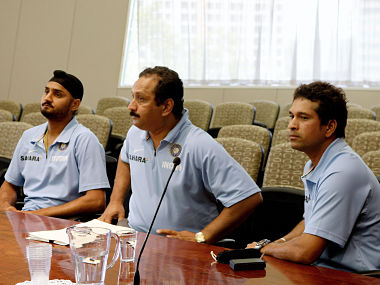N Jagannath Das
This day eight years ago (October 30), Maturi Venkat Sridhar left us. He was just 51 years old when he succumbed to cardiac arrest. Sridhar was a quintessential all-round personality — a man of many talents. He was Hyderabad’s leading run-getter, scoring 6,701 runs with 21 hundreds between the 1988 and 1999-2000 seasons. An accumulator of runs, he famously scored a mammoth 366 against Andhra at Gymkhana during the 1993-94 season. Incidentally, whenever he played against Andhra, he seemed to score heavily.
I first met this doctor-turned-cricketer-administrator in a friendly match in 1986. Though a qualified doctor, Sridhar’s heart was firmly set on cricket — and perhaps that medical training made him more patient at the crease. After retirement, he wore many hats in cricket administration. He also served as media manager of the Anil Kumble-led Indian team during the controversial 2007-08 tour of Australia. Kumble was all praise for Sridhar’s composure and administrative skill during that turbulent tour, particularly when it snowballed into acrimony over the infamous “Monkeygate” episode involving Harbhajan Singh and the late Andrew Symonds. “I liked the way he handled that issue,” Kumble said later.
Fondly known as “Doc,” Sridhar indeed wore many hats — doctor, cricketer, corporate executive, cricket administrator, singer, actor, and writer — as noted by Harimohan Paruvu, who wrote a book on him titled The Renaissance Man. “He excelled in handling tough assignments at both national and international levels,” said Harimohan, former fast bowler and currently chairman of the Hyderabad selection committee.
Recognizing his administrative acumen, BCCI president N. Srinivasan appointed Sridhar as General Manager (Cricket Operations). He was the tournament director of the 2016 ICC T20 World Cup in India and later travelled to the West Indies to oversee management after coach Anil Kumble’s resignation. Despite his senior position at the BCCI, Sridhar resigned in 2017 due to a possible conflict of interest arising from his association with multiple cricket clubs under the Hyderabad Cricket Association (HCA). Before rising to national prominence, he had been actively involved in HCA’s administration.
)
A product of All Saints High School, Sridhar created a record of sorts in the Hyderabad league by scoring 13 centuries in a row, which led to his selection for the Ranji Trophy team in 1988 — and he never looked back. During his glorious Ranji career, he often shared rooms with off-spinner Kanwaljit Singh. “He was a happy and lucky fellow — a very consistent batter who could play on all types of wickets. On spinning tracks, he was brilliant. He had excellent footwork and would score when others struggled. While fielding, he would crack jokes and keep everyone in splits. Off the field, he was lively and full of fun. I miss him a lot,” recalled Singh.
Venkatapathy Raju, the former India left-arm spinner, said Sridhar had a knack for scoring runs on difficult, turning tracks. “He knew how to keep it simple and build an innings. Sridhar was full of fun, both on and off the field. His Ranji years were the best phase of his life. He would light up the dressing room with his witty jokes,” Raju remembered. Sridhar captained Hyderabad in 30 matches.
After Sridhar’s untimely death, his mother, Dr. M. Pushpa, once suggested that I write his biography. “I’ve read many of your articles on Sridhar — why don’t you write his biography?” she asked. But I felt Harimohan was the best person for that. “Initially I was hesitant,” Harimohan admitted, “but later I thought youngsters should learn from his life and be inspired.” He interviewed 64 people — friends, schoolmates, colleagues, and teammates — and, as he said, “After speaking to them, many new facets of Sridhar’s personality were revealed to me.”
V.V.S. Laxman, who wrote the foreword to The Renaissance Man, recalled: “I always adored Sridhar as a cricketer and a mentor. He was a true team man and, for me, the best captain I ever played under. He taught me the tactical and psychological aspects of batting and helped me strengthen my mental toughness. His sudden passing was a rude shock — a personal loss.”






